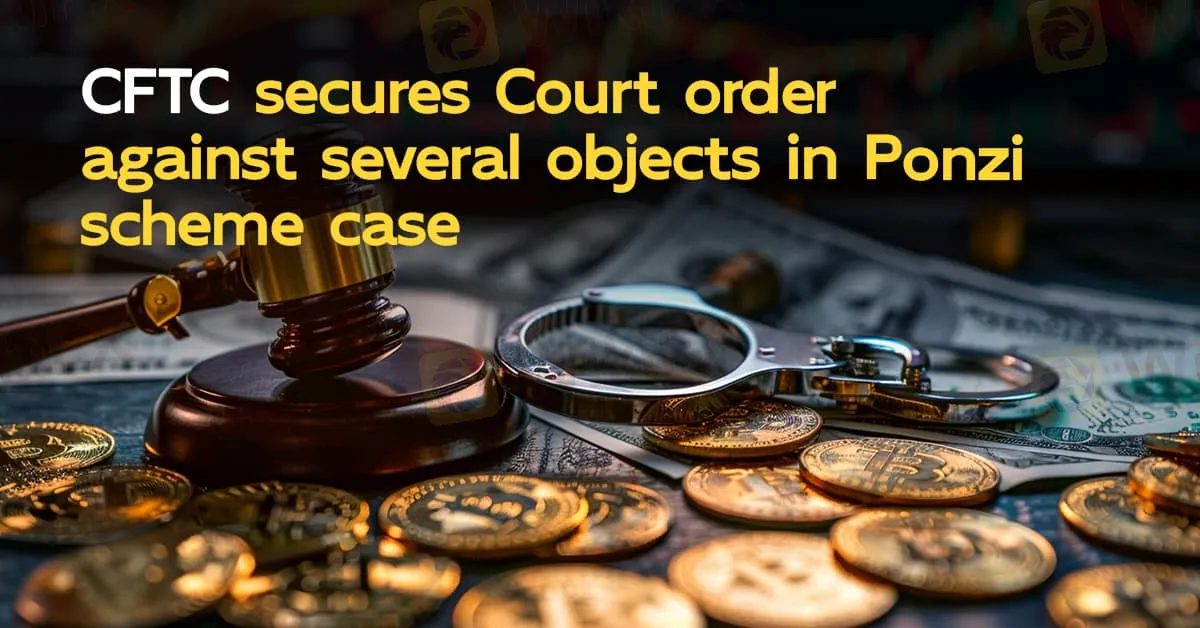简体中文
繁體中文
English
Pусский
日本語
ภาษาไทย
Tiếng Việt
Bahasa Indonesia
Español
हिन्दी
Filippiiniläinen
Français
Deutsch
Português
Türkçe
한국어
العربية
CFTC secures Court order against several objects in Ponzi scheme case
Abstract:The Commodity Futures Trading Commission (CFTC) has achieved a significant legal victory in a case against Sam Ikkurty, Jafia, LLC, Ikkurty Capital, LLC, and related entities. Judge Mary Rowland of the Illinois Northern District Court granted a summary judgment in favor of the CFTC, ruling on all counts of the complaint.

The Commodity Futures Trading Commission (CFTC) has achieved a significant legal victory in a case against Sam Ikkurty, Jafia, LLC, Ikkurty Capital, LLC, and related entities. Judge Mary Rowland of the Illinois Northern District Court granted a summary judgment in favor of the CFTC, ruling on all counts of the complaint.
The court order, announced today, mandates substantial financial repercussions for the defendants. Sam Ikkurty of Oregon, along with Jafia, LLC and Ikkurty Capital, LLC, operating under various names such as Rose City Income Fund I, Rose City Income Fund II, and Seneca Ventures, LLC, faces a combined restitution and disgorgement totaling more than $120.6 million. This includes over $83.7 million in restitution and $36.9 million in disgorgement, jointly and severally.
The judgment stems from allegations that the defendants orchestrated a Ponzi scheme, deceiving investors through false promises and misrepresentations. According to the CFTC, Ikkurty attracted participants through webinars and trade shows, enticing them with guarantees of a 15% annual income from investments in digital asset commodities like Bitcoin and Ethereum, as well as commodity interests.
Judge Rowland's order affirms that these representations were misleading, with Ikkurty failing to deliver any actual profits to investors. Instead, funds were allegedly misappropriated, including through a dubious carbon offset program where promised collateral was not obtained, resulting in significant financial losses for participants.

In addition to the financial penalties, the defendants were found to have violated the Commodity Exchange Act (CEA) and CFTC regulations, including operating as unregistered commodity pool operators. The court emphasized that digital assets like Bitcoin and Ethereum fall under the CFTC's regulatory purview, extending to other virtual currencies such as OHM and Klima.
The CFTC cautioned that while orders for restitution aim to recover lost funds for victims, the complex nature of Ponzi schemes often means that full recovery may not be possible if perpetrators lack sufficient assets.
The outcome underscores the CFTC's commitment to protecting investors and maintaining integrity in commodity markets, signaling a stern stance against fraudulent schemes within the digital asset sector.

Disclaimer:
The views in this article only represent the author's personal views, and do not constitute investment advice on this platform. This platform does not guarantee the accuracy, completeness and timeliness of the information in the article, and will not be liable for any loss caused by the use of or reliance on the information in the article.
Read more

Truth About Markets.com: 5 Hidden Risks Revealed
There are many brokers that offer too many promotions. Have you ever wondered why they do this? This Could be the story of Markets.com. Before you choose Markets.com, read about the hidden risks they never openly talk about.

Breaking News: OmegaPro Caught in a $650 Million Forex and Crypto Investment Scam
An indictment was leveled against two men in the District of Puerto Rico for their alleged involvement in the operation and promotion of OmegaPro, an international investment scheme that has led to financial losses worth over $650 million for investors. Check more about this story

Scammed by a Click: He Lost RM300,000 in a Month
A company director in Malaysia lost over RM300,000 after falling for an online investment scam he found on Facebook.

Manual vs. Automated Forex Trading: Which One Should You Choose?
Both manual and automated forex trading have their strengths and weaknesses. Should you trade manually or use automated systems? Today’s article may give you some clues.
WikiFX Broker
Latest News
Global stock markets are calling Trump's bluff on tariffs
Trump's tariffs overshadow the pomp and pageantry as Macron meets King Charles
Boeing delivers most airplanes since late 2023 after ramping up 737 Max output
Inflation expectations drift back down to pre-tariff levels, New York Fed survey shows
MT4 vs MT5: A comprehensive comparison in terms of functionality
Top Forex Trading Strategies for the London Session
Swissquote Takes Full Control of Yuh Digital Finance App in Major Deal
Top 5 Forex Pairs Every Trader Should Have on Their Radar
What WikiFX Found When It Looked Into Decode Global
Treasury yields rise as Trump's new tariff rates in focus
Currency Calculator


